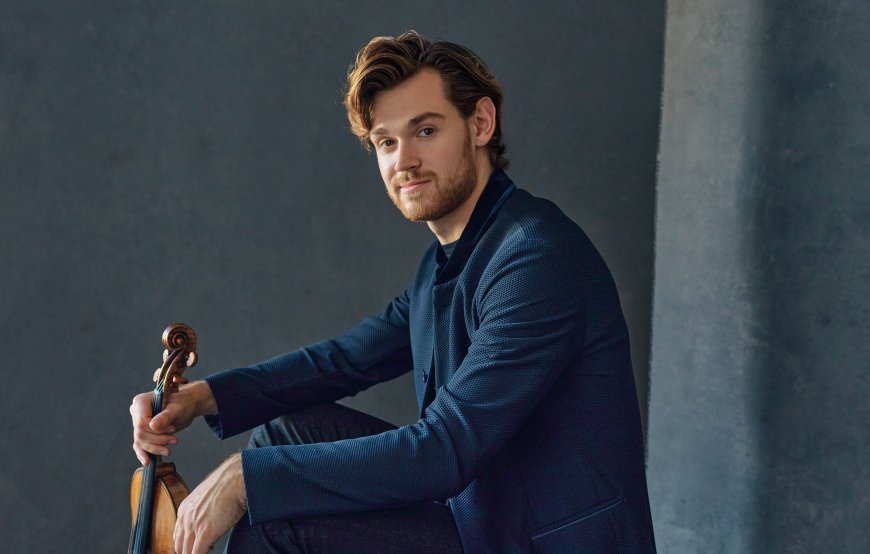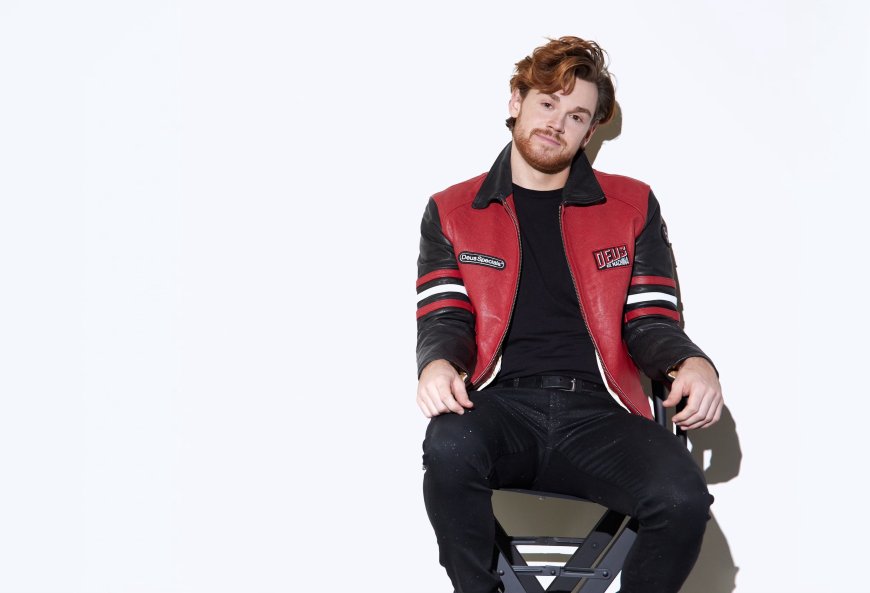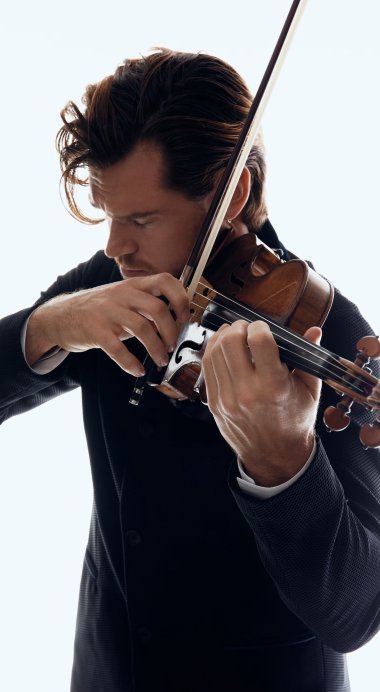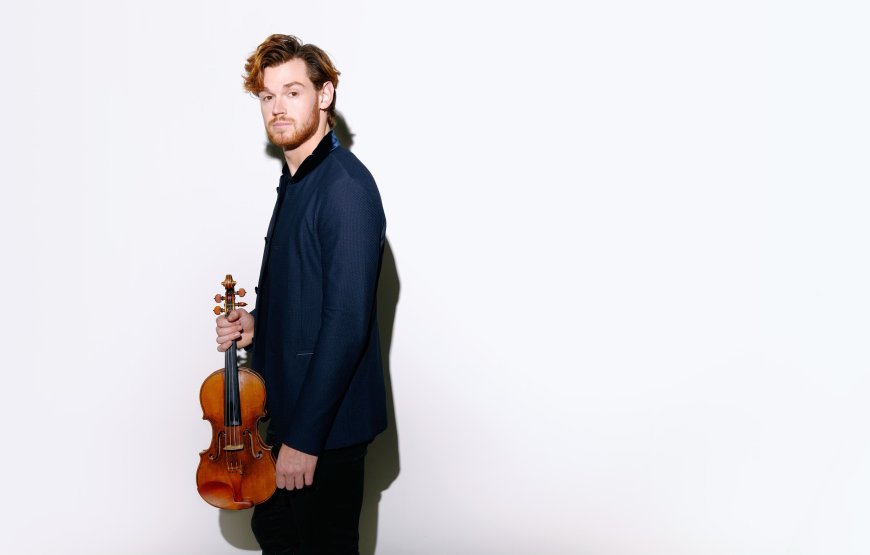
Despite being constantly on the road, violinist Blake Pouliot considers himself a homebody.
“I’m drawn to community and familiarity of space and comfort,” Pouliot told SF Classical Voice in a recent Zoom interview. He was speaking from his Brooklyn apartment, where he was taking a rare break from his tour schedule before spending the July 4 weekend with family in Canada — his only free weekend of the summer.
For the Toronto-born Pouliot, familiarity has artistic implications, too. He explained that one of his biggest goals — and biggest challenges — is making each concert hall he plays in feel like an intimate shared space for the entire audience.
The 31-year-old graduated from Los Angeles’ Colburn School in 2018 and has seen his career ramp up dramatically since the end of the COVID-19 pandemic. Now in high demand as a soloist and chamber musician, he spends more than half the year on tour.
“I finally feel like I’m starting to understand my own methods of how I perform and how I learn,” he said.
Pouliot is set to play Tchaikovsky’s Violin Concerto with the San Francisco Symphony on July 10 at Stanford Live’s Frost Amphitheater and on July 11 at Davies Symphony Hall. The all-Tchaikovsky concerts are slated to feature conductor Stephanie Childress in her debut with the orchestra.
This interview has been edited for length and clarity.

You’ve played with orchestras, had residencies in the U.S. and abroad, put out a record, and done solo tours. How have you found being on tour compared to working with a single institution or in a single place for an extended period of time?
I’m traveling close to 250 days a year. It’s really crazy, but it’s good. This is kind of what I expected and what I knew would be part of it. I thought I would get more used to being on the road, which, in a sense, I am. But I [also] thought I would be able to transition easier. It actually gets harder. I get more and more nostalgic for spending time at home and having a little bit of a grace period.
What you do get used to is your needs and your routines that you have to maintain when you’re on the road, and so that’s gotten better. I really like the combination of everything I do, the majority of [which] is performing concertos with different orchestras. But this summer I also get to go to different chamber festivals.
Can you walk us through how you curate the repertoire for a tour?
More often than not, I’m trying not to oversaturate my repertoire too much because it’s easy to just say yes to things, and then you end up playing so many different concertos. I’m not one of those performers. I can’t really keep a super large [number] of pieces under my fingers at once.

I consider myself more like a method actor. I like absorbing myself into music and the repertoire that I’m learning. I find that when I have too many pieces or too many characters that I’m trying to play, I can’t fall into that world, into that universe of each piece.
So this summer, I have four different concertos in my repertoire, and I’ve played those in multiple different places. And that feels like enough. That’s on top of 20 different chamber pieces plus two different recital programs.
You’ve said that you almost abandoned the violin completely to pursue acting but realized you prefer to perform as yourself. How do you preserve a sense of identity in music and how does that connect to playing a character?
In my adolescence, I was really into acting in musical theater, and I loved this idea of capturing a character and portraying them. [But] I realized that playing characters who I thought were awful or I disliked or [were] stupid I just couldn’t get behind.
[I know that] I love singers, and I love the idea of singing, and I think that it’s the most organic and natural form of expression in music. I mean, the human body is creating the sound and then matching that with emotion and breathing. And so for violin, I want to mimic that to the best of my ability.
When I perform a concerto, particularly, it’s one of the hardest mediums for me to fully absorb into because I really like feeling like I’m part of the entire machine of each piece. And with a concerto, you’re in the spotlight [but] have to constantly juggle being a partner with the orchestra and conductor and finding your own footing and where to stand out.
This brings us to your most recent character: the Tchaikovsky Violin Concerto. You just performed it a few nights ago.
It was a very different experience. I was working at the Monteux School up in Maine with a bunch of young conductors, and they were alternating conducting different movements, which was fascinating for so many reasons. As you’re ascending in your career [as a soloist], the conductor is the center point of the collaboration, and they also have a lot of power and control. In fact, so much of my career is built upon conductor relationships and conductors bringing me [in] and supporting me. It’s interesting to be in a position with younger conductors who are looking up to me for that leadership and as a role model. It was kind of a fun turn of events but also brilliant in a way, and they did so well.
It’ll be completely different to work with the San Francisco Symphony and with Stephanie, who I’ve never met before, but we’ve chatted a little bit via social media. It’ll be cool, actually, just to have a totally different experience and work with an orchestra who’s played [the piece] hundreds of times.
You’ve played with the SF Symphony before, pre-COVID. How does it feel to be coming back while also collaborating with someone new?
It’s always nice to return somewhere. I love Davies, and I loved working with the San Francisco Symphony, so I’m delighted to be invited back.
[With] Stephanie, I’ve heard such wonderful things, and I love working with people who have [a reputation for] vigor and energy. [This relates to what] we’ve been talking about [with] this idea of committing to something and not just [getting] lost within the treadmill of performing and traveling so constantly. I try to exist in this world as if it doesn’t matter [whether] I’m working with young conductors at a festival up in Maine or playing with the San Francisco Symphony. Each performance should feel committed to like it’s Carnegie Hall.
Your Stanford performance with the SF Symphony will be at an outdoor venue. Does the nature of the space lend itself to Tchaikovsky’s piece at all?
No, definitely not. It is the antithesis of that. [Violins are] designed to be played in churches, to be played indoors and [with] as much temperature control as possible. Playing outdoors, you have to relinquish a lot of control when it comes to your sound and so much of the finesse. … But at the same time, there’s something freeing about the fact that you just have to let go [and] commit to what is actually important.

You’ve previously described Tchaikovsky as the king of melodies. Does he still hold that title in your mind?
Absolutely. I would say that many people would agree with that. I mean, his ability to cultivate so many melodies that are so good and still hold up — there’s a reason why we call [such] composers “masters” of their craft.
You often take to social media before a performance to post a video practicing or warming up, captioning it with something you appreciate about the piece you’re playing. What would the caption for Tchaikovsky be?
It’s so incredible how in such a short amount of time, Tchaikovsky is able to capture the essence of an opera within so many different parts of this concerto — particularly the first movement, within a five-minute window. It’s just really cool to try to be a one-person opera.




